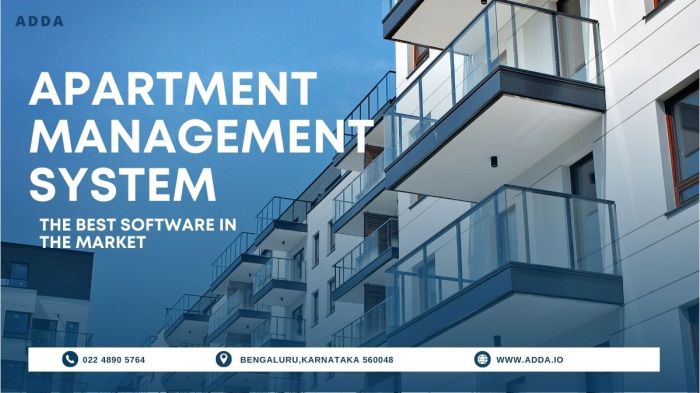Mastering Apartment Property Management: A Comprehensive Guide

Apartment property management sets the stage for this enthralling narrative, offering readers a glimpse into a story that is rich in detail and brimming with originality. From defining the role to exploring essential skills and tenant relations, this guide covers all aspects of managing apartment properties.
Definition of Apartment Property Management
Apartment property management involves overseeing the day-to-day operations of an apartment complex to ensure smooth functioning and tenant satisfaction. It includes various tasks related to maintenance, rent collection, tenant communication, and overall property upkeep.
Responsibilities of Apartment Property Managers
- Handling tenant inquiries and concerns promptly and professionally.
- Supervising maintenance and repairs to ensure the property is well-maintained.
- Collecting rent and enforcing lease agreements.
- Marketing vacant units and screening potential tenants.
- Managing budgets and financial records for the property.
Importance of Effective Property Management for Apartment Complexes
Effective property management is crucial for apartment complexes as it plays a significant role in tenant retention, property value, and overall profitability. By maintaining a well-managed property, apartment managers can enhance the living experience for tenants, attract new residents, and ensure the long-term success of the complex.
Essential Skills for Apartment Property Managers
To be successful in apartment property management, there are several key skills that are essential. These skills not only help in effectively managing properties but also in maintaining tenant satisfaction and ensuring the overall success of the property.
Key Skills for Successful Apartment Property Management
- Communication Skills: Apartment property managers need to effectively communicate with tenants, property owners, maintenance staff, and other stakeholders. Clear and concise communication helps in resolving issues quickly and building positive relationships.
- Organizational Skills: Managing multiple properties requires excellent organizational skills to keep track of maintenance schedules, rent payments, lease agreements, and other important documents.
- Problem-Solving Skills: Property managers must be able to quickly address and resolve any issues that arise on the property, whether it's a maintenance problem or a tenant dispute.
- Customer Service Skills: Providing excellent customer service to tenants is crucial for tenant retention and satisfaction. Property managers should be responsive to tenant needs and concerns.
- Financial Management Skills: Apartment property managers need to have a good understanding of budgeting, accounting, and financial reporting to ensure the financial success of the property.
Residential vs. Commercial Property Management Skills
- Residential Property Management: Residential property managers focus more on tenant relations, lease agreements, and maintenance of individual units. Strong customer service skills are particularly important in residential property management.
- Commercial Property Management: Commercial property managers deal with larger properties, such as office buildings or retail spaces. They need to have a good understanding of leasing agreements, property valuation, and market trends.
Significance of Communication Skills in Property Management
Effective communication is crucial in property management as it helps in building strong relationships with tenants, property owners, and service providers. Clear communication leads to better problem-solving, increased tenant satisfaction, and overall success in managing properties.
Tenant Relations and Customer Service
Maintaining positive tenant relations and providing excellent customer service are essential aspects of apartment property management. By fostering a good relationship with tenants, property managers can create a more pleasant living environment and reduce turnover rates. Effective customer service can also lead to higher tenant satisfaction and positive reviews.
Improving Tenant Relations
Building strong relationships with tenants can be achieved through various strategies, such as:
- Regular communication: Keeping tenants informed about property updates, events, and policies through newsletters, emails, or social media.
- Resolving issues promptly: Addressing maintenance requests and concerns in a timely and efficient manner to show tenants that their well-being is a priority.
- Organizing community events: Hosting social gatherings, workshops, or activities to foster a sense of community and belonging among tenants.
Handling Tenant Complaints Effectively
When faced with tenant complaints, property managers can follow these strategies:
- Active listening: Listening attentively to the tenant's concerns without interrupting and showing empathy towards their situation.
- Offering solutions: Proposing viable solutions to address the issue and following up to ensure that the problem has been resolved satisfactorily.
- Documenting complaints: Keeping a record of all complaints and their resolutions to track recurring issues and improve property management practices.
Importance of Excellent Customer Service
Providing exceptional customer service in apartment property management is crucial because:
- It enhances tenant satisfaction: Happy tenants are more likely to renew their leases and recommend the property to others, reducing vacancy rates.
- It builds a positive reputation: Word-of-mouth recommendations and online reviews can significantly impact the property's reputation and attract new tenants.
- It increases tenant retention: By addressing tenant needs promptly and professionally, property managers can create a loyal tenant base and minimize turnover.
Maintenance and Repairs in Apartment Complexes
When it comes to managing apartment complexes, maintenance and repairs are crucial aspects that can directly impact the value of the property and the satisfaction of tenants. Having a well-planned preventive maintenance strategy in place can help prevent costly repairs and ensure the longevity of the building.
In addition, knowing how to handle emergency repairs efficiently is essential to maintaining a safe and comfortable living environment for tenants.
Preventive Maintenance Plan for Apartment Buildings
- Regular inspections of the building's structure, plumbing, electrical systems, and HVAC units can help identify minor issues before they escalate into major problems.
- Creating a schedule for routine maintenance tasks such as cleaning gutters, servicing HVAC systems, and checking for leaks can help prolong the lifespan of building components.
- Keeping detailed records of maintenance activities and repairs can provide valuable insights into the overall condition of the property and help in budgeting for future maintenance needs.
Handling Emergency Repairs in an Apartment Complex
- Establishing clear protocols for reporting and responding to emergency repairs is essential to ensure a timely resolution of issues such as burst pipes, electrical failures, or structural damage.
- Maintaining a list of reliable contractors and service providers for emergency repairs can help expedite the repair process and minimize disruptions for tenants.
- Communicating effectively with tenants about emergency repair procedures and providing them with emergency contact information can help maintain trust and transparency in property management.
Regular Maintenance and Property Value
- Regular maintenance not only helps prevent costly repairs but also enhances the overall aesthetics and functionality of the property, thereby increasing its market value.
- Well-maintained properties are more attractive to potential tenants and can command higher rental rates, leading to increased income for property owners.
- Investing in regular maintenance shows a commitment to the long-term upkeep of the property, which can result in higher property appreciation over time.
Financial Management for Apartment Properties
Effective financial management is crucial for apartment property managers to ensure the smooth operation and upkeep of the complex. This involves creating and managing budgets, maintaining financial records, and implementing cost-saving strategies to maximize profitability.
Creating and Managing Budgets
Budgets are essential tools for apartment property managers to plan and allocate funds for various expenses such as maintenance, repairs, utilities, and upgrades. By carefully analyzing past expenses and forecasting future needs, managers can create realistic budgets that ensure financial stability.
It is important to regularly review and adjust budgets to adapt to changing circumstances and avoid overspending.
Importance of Financial Reporting and Record-Keeping
Financial reporting and record-keeping are vital for monitoring the financial health of an apartment complex. Managers must maintain accurate records of income, expenses, and investments to track financial performance, identify areas for improvement, and make informed decisions. Regular financial reports help stakeholders understand the financial status of the property and ensure transparency in financial matters.
Cost-Saving Strategies
Implementing cost-saving strategies is key to maximizing profitability in apartment complexes. Some examples include:
1. Energy-efficient upgrades to reduce utility costs.
- Preventative maintenance to avoid costly repairs.
- Negotiating discounts with vendors for bulk purchases.
- Implementing recycling and waste reduction programs to lower waste disposal costs.
- Encouraging residents to report maintenance issues promptly to prevent further damage.
By adopting these strategies and continuously seeking ways to optimize expenses, apartment property managers can enhance the financial performance of the property and provide better value to tenants.
Legal Compliance and Regulations

When managing apartment properties, it is crucial to be aware of the various legal issues that may arise. From fair housing laws to lease agreements, apartment property managers must navigate a complex web of regulations to ensure compliance and avoid potential legal disputes.
Common Legal Issues
- Discrimination: Ensuring that all tenants are treated fairly and equally in accordance with fair housing laws.
- Lease Violations: Enforcing lease agreements and handling situations where tenants fail to comply with terms.
- Property Maintenance: Meeting safety and habitability standards to prevent any liability issues.
- Evictions: Following proper procedures when evicting tenants to avoid legal repercussions.
Importance of Staying Up-to-Date
Keeping up-to-date with housing laws and regulations is essential to protect both the property manager and the tenants. By staying informed about any changes or updates in regulations, property managers can ensure that their practices are in compliance and avoid costly legal battles.
Steps in Case of Legal Dispute
- Consult with Legal Counsel: Seek advice from a legal professional to understand your rights and responsibilities.
- Document Everything: Keep detailed records of communications, lease agreements, and any relevant information related to the dispute.
- Attempt Mediation: Try to resolve the dispute amicably through mediation or negotiation before pursuing legal action.
- Follow Legal Procedures: If legal action is necessary, ensure that you follow all proper procedures and protocols to protect your interests.
Conclusion
In conclusion, apartment property management is a multifaceted endeavor that requires a blend of skills, communication, and financial acumen. By mastering the art of property management, one can ensure the smooth operation and success of apartment complexes.
FAQ Guide
What are the common legal issues faced by apartment property managers?
Common legal issues include lease violations, eviction procedures, and property maintenance disputes.
How can apartment property managers improve tenant relations?
Building a sense of community, responding promptly to concerns, and organizing social events can enhance tenant relations.
What is the significance of financial reporting in property management?
Financial reporting helps track expenses, monitor budget adherence, and make informed decisions for the property.
What are some cost-saving strategies for apartment complexes?
Implementing energy-efficient upgrades, conducting regular maintenance, and negotiating bulk service contracts are effective cost-saving strategies.




